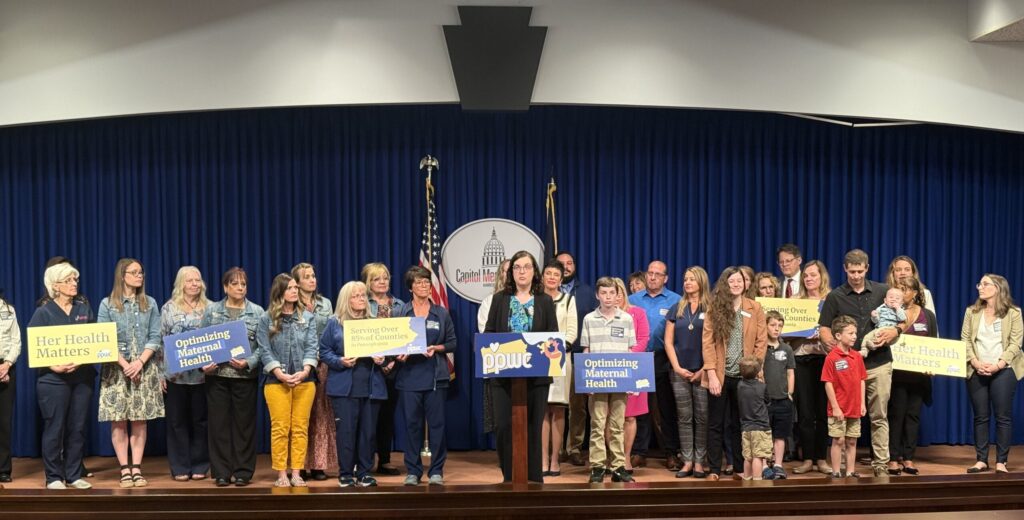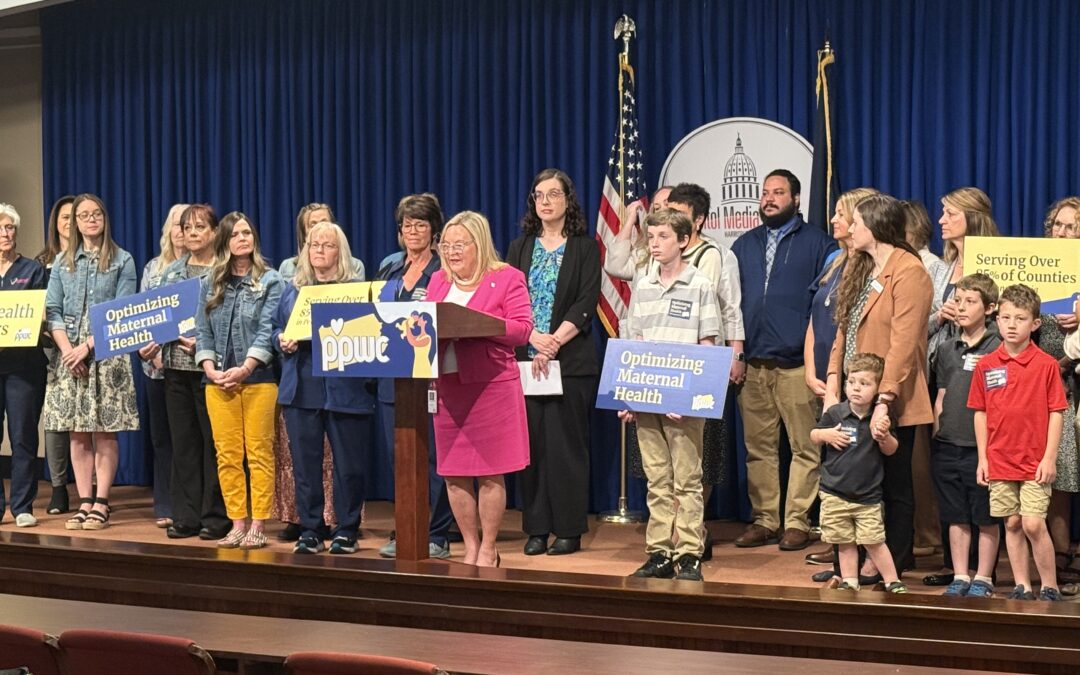The Pennsylvania Pregnancy Wellness Collaborative (PPWC) brought together medical professionals, pregnancy resource center leaders, and community advocates this week for its second annual Day of Advocacy at the State Capitol. The event, held at the Capitol Media Center in Harrisburg, showcased the vital role community-based pregnancy centers play in addressing Pennsylvania’s growing maternal health crisis—and the urgent need for lawmakers to support these centers with meaningful policy and funding.
As the PPWC’s statewide network spans 87 centers operating at 161 locations across 78% of Pennsylvania counties, their collective impact cannot be overstated. These centers provide critical, often lifesaving services such as early pregnancy testing, ultrasounds, prenatal education, STI treatment, postpartum support, and referrals to community and medical resources, most at no cost to the women and families they serve. In total, these services are valued at more than $8.9 million annually, a testament to their efficiency and the generosity of the communities that support them.
But the message at today’s press conference was clear: these centers are not just helpful—they are essential.

“Maternal and infant wellness must remain a top priority in our state,” said Sarah M. Bowen, Executive Director of Promise of Life Network. “Our centers are often the first point of contact for women suspecting pregnancy, offering timely access to care and education that can drastically improve outcomes for both mothers and babies.”
“Maternal and infant wellness must remain a top priority in our state,”
Sarah M. Bowen, Executive Director of Promise of Life Network.
That early intervention is especially crucial. According to PPWC research, the average first prenatal visit occurs at 9.6 weeks gestation—a full two weeks after the ideal window for early care. Barriers such as limited transportation, financial strain, and long appointment wait times often push critical care further down the line. Pregnancy Medical Clinics (PMCs) and Pregnancy Resource Centers (PRCs) help bridge that gap, particularly in underserved rural and urban communities.
These centers are also combating the rise in chemical abortions—a method now accounting for over 56% of all abortions in Pennsylvania. As we’ve reported, the abortion pill mifepristone is not the “safe and simple” solution its promoters claim. A groundbreaking new study, analyzing over 865,000 abortion cases, found that nearly 11% of women who take the abortion pill suffer serious complications, including hemorrhage, sepsis, and infection. That’s 22 times higher than the outdated and misleading 0.5% rate previously cited by the FDA.
“Taking the findings in this study into account, more than 2,000 women in Pennsylvania alone are potentially suffering serious health complications from the abortion pill every year,” said Dan Bartkowiak, Chief Strategist at PA Family Institute.
This isn’t just data—it’s a reality playing out in communities across our state. One tragic example came from East Donegal Township in Lancaster County, where a teenage girl, after being turned away by a clinic due to how far along she was, turned to abortion pills obtained online. Alone and scared, she gave birth to a fully formed baby at home and later buried the baby in her backyard. In her own heartbreaking words, shared through text messages: “It just came out now and it’s like a full baby and it’s still moving.”
No woman should face such trauma alone. And no industry that claims to care for women should leave them abandoned in their darkest moments.
Lexi Sneller, policy analyst at PA Family, said it bluntly: “Women deserve better. Women’s health is put at risk, as well as the lives of unborn babies, when purchasing abortion pills online.”
That’s why the community-based model supported by PPWC is so important. These centers offer not only professional care, but compassion, dignity, and support—things the abortion industry often leaves out.
“Our goal is to meet each woman where she is,” said Amy Scheuring, Executive Director of Women’s Choice Network. “With compassion, dignity, and personalized care that empowers her to make informed decisions for her health and her family.”
Unfortunately, the threat to women’s health is not just theoretical—it’s growing. According to the latest Pennsylvania Department of Health report, abortion-related complications among women have doubled since 2020. This correlates directly with the FDA’s reckless decision in January 2023 to eliminate the in-person requirement for dispensing abortion pills. That same year, Planned Parenthood and other abortion providers in the state moved aggressively toward mail-order abortion, leaving women to manage dangerous, painful procedures alone.
And the burden isn’t distributed equally. Black women in Pennsylvania account for 44% of all abortions—nearly the same number as white women—despite being just 11% of the population. Philadelphia County, with the highest concentration of African-American residents in the state, represents nearly a third of all abortions statewide.
PPWC centers are actively working to address these disparities by offering culturally competent care, trauma-informed services, and trusted partnerships with local health providers. In doing so, they are not just offering services; they are building relationships, restoring hope, and saving lives.
As maternal health outcomes in the U.S. continue to decline, it’s clear that we cannot afford to ignore the solutions already working in our communities. Pregnancy centers are not a threat—they are the frontlines of real care.
At the Pennsylvania Family Institute, we proudly stand with PPWC and the incredible network of life-affirming pregnancy centers across our state. These centers are serving women with compassion and excellence, often filling the void left by profit-driven abortion providers. They deserve our support, not just in word, but in public policy.
It’s time our lawmakers recognized that the answer to the maternal health crisis isn’t more abortion—it’s more support, more care, and more love. Community-based solutions like those provided by PPWC centers aren’t just effective—they’re essential.
Join us in supporting these efforts and defending women and children across Pennsylvania.
Learn more and get involved at https://papregnancy.com.




